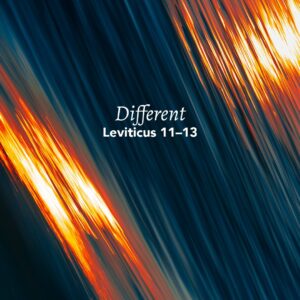Leviticus 11-13: Different
February 19, 2024
TODAY'S BIBLE READING:
Leviticus 11-13; Psalm 41; Matthew 18:15-35; Acts 25:13-27

Part of the difficulty with interpreting these laws as contemporary followers of Jesus is that the situation then was not only so different from today—a large nation, on the move, in camp, without modern medical techniques, where problems with sanitation and “cleanliness” must have been ever present—but that what we in the new covenant have separated was there conjoined. They were a nation, a congregation, a military group all together as one: a “theocracy.”
However, the New Testament Church (in this way different from the Old Testament people of God, though in other respects there are multiple points of similarity) is not a “theocracy.” God’s people are “scattered” among the nations; in God’s plan, we are a multi-national group of people from every tribe and nation, and we are to render to Caesar what is Caesar’s and to God what is God’s (Matt. 22:21). We submit to pagan authorities, as far as we can in obedience to God and in the call to worship him and proclaim his name; we pay our taxes.
But this side of glory, there is inevitably now a separation of some kind between so-called “secular” nations and the church of God. Different points of history have played out this distinction in different ways. Some churches, of course, are “established” churches where there is far more union between political establishment and the religious establishment, but nonetheless, even in Medieval Europe there was a point of dissimilarity between cleric and warrior knight, between king and archbishop.
But what is woven together here in these chapters seems to us not to belong together. Why put rules about whether to eat certain kinds of food (Lev. 11)—not pork (11:7-8), not sea creatures without scales (11:9-12)—right next to rules about leprosy and infectious skin diseases (Lev. 13)? And why in the middle of these chapters declare that there is an undergirding rationale in the call of God’s people to be holy as he is holy for God has rescued them from Egypt (11:44-45)? Why a specifically “religious” reason for not eating shrimp? Very strange, at least to our ears, though probably not to theirs who were used to the Egyptian model of a nation that had a religious and political and military union. That was the standard model of the ancient world, though it is not our standard model anymore. It is possible that some of these food laws are for medical reasons. Some of the restricted elements of the diet seem to be related to animals that carry more risk of having diseased flesh, and so without especially strict (modern) regimes about how to cook pork, it could be dangerous to consume it. Similarly with the leprosy rules, and perhaps even with some of the childbirth rules (Lev. 12) intended to give the mother an opportunity to heal and recover in peace. There are medical, practical, dietary elements here.
But then at the same time there is an overall religious theme: God is separating his people from the nations around to indicate that they are different, that they are not to be like the other nations, that they are a holy people. The simplest analogy from a New Testament perspective is that the specifically sacrificial laws are fulfilled in Christ, the specifically national laws are not applicable because we are no longer a theocracy, and the overarching emphasis on being different remains. Come out from them and be separate remains a call of the New Testament, not to be “weird” or purposefully “out-of-date,” much less pridefully different in a super-spiritual sort of way, but to have standards of morality and godliness and holiness that are distinctly Christian or distinctly Christ-like. We march to the beat of a different drum—making clear our profession of faith and living in the world but not of the world, but still different. And it is that very difference that attracts: we worship the living God who calls his followers to be holy as he is holy.
ABOUT THE AUTHOR
Josh Moody (Ph.D., University of Cambridge) is the senior pastor of College Church in Wheaton, IL., president and founder of God Centered Life Ministries, and author of several books including How the Bible Can Change Your Life and John 1-12 For You.
WANT MORE?
To receive God Centered Life devotionals directly in your inbox, as well as other resources, enter your email address in the form at the bottom of this page and click "subscribe."

